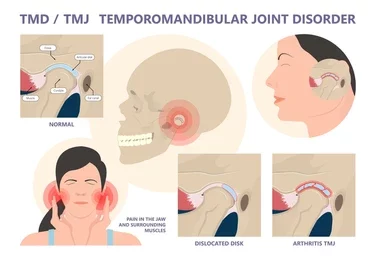Temporomandibular joint disorder (TMD), also known as TMJ disorder, refers to a range of conditions affecting the jaw joint and surrounding muscles. Symptoms can include jaw pain, difficulty chewing, clicking or popping noises in the jaw, and lockjaw. TMD/TMJ disorders may result from teeth grinding, jaw misalignment, arthritis, or injury. Treatment options vary from lifestyle changes and medications to dental appliances and physical therapy, aiming to alleviate pain and improve jaw function. Early diagnosis and personalized treatment plans are crucial for managing TMD/TMJ effectively and restoring comfort and oral health.

TMJ disorder (TMD) is caused by problems with the joints and muscles around the jaw, which can result in jaw pain, headaches, and other problems. TMD occurs in both men and women, and dentists can usually diagnose it after discussing the symptoms and examining the jaw and teeth. The symptoms of TMJ disorder include the following:
If you suspect you have TMJ disorders, you should seek treatment as soon as possible. Untreated TMJ disorders can eventually lead to severe discomfort and other problems, including headaches and chronic facial pain.
You need TMD treatment if:
Treatment for TMJ disorders varies and may include conservative treatments such as anti-inflammatories, rest, muscle relaxants, physical therapy, or bite guards. If conservative treatment doesn’t work, your doctor may suggest surgery.
If you have mild TMJ disorder, you may benefit from dental guards. These guards are worn in the mouth over the teeth, and they can help to prevent teeth grinding and clenching. In addition, some dentists recommend relaxation techniques, such as yoga and meditation.
Patients who experience TMJ problems are encouraged to speak with their dentist about treatment options
Schedule a consultation with our team by calling the Infinity Dental office or by contacting us online to know more. We would be happy to help.
